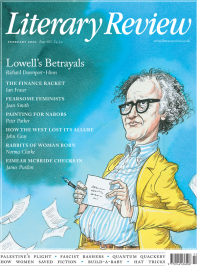Michael Prodger
About Suffering He Was Never Wrong
Short Life in a Strange World: Birth to Death in 42 Panels
By Toby Ferris
Fourth Estate 326pp £20
In an earlier life, Toby Ferris was employed as a developer of an immersive video game. He became comfortable working at the intersection of data and imaginative worlds. The game he was trying to create eventually proved too complicated, the alternative, manufactured world’s possibilities being simply too multifarious. Ferris drifted off but took his skills with him. A few years later he decided to apply them to the paintings of one of art’s great originals, Pieter Bruegel the Elder.
Shortly before Ferris turned forty-two, his father died. Looking at Bruegel’s work – so rich in parables of life and death – he conceived a project to see every one of the forty-two surviving panels, which are spread across twenty-two galleries, nineteen cities, twelve countries and two continents. Bruegel died in 1569. His precise birth date is unknown, but 1525 or thereabouts is widely accepted, making the artist only a little older when he died than Ferris was at the start of his project. Ferris’s father, meanwhile, died at eighty-four, providing a tidy numerical symmetry. These statistical coincidences gave rise to an old-fashioned quest, albeit a slightly woolly one. He did not want his enterprise to resemble a form of artistic stamp-collecting: ‘It is not Bruegel’s completeness that I am interested in,’ Ferris states, ‘but my own.’ Bruegel is a funny person to turn to nevertheless: a painter of cavortings, the Tower of Babel and apocalypse.
The result of all this is an uncategorisable book that mingles paintings and pensées, history and life lessons, travel and memoir. The pictures, every one of them enigmatic, stimulate innumerable musings and thoughts, some random, some focused. Unlike the works of his Italian contemporaries, very few of Bruegel’s paintings have

Sign Up to our newsletter
Receive free articles, highlights from the archive, news, details of prizes, and much more.@Lit_Review
Follow Literary Review on Twitter
Twitter Feed
Juggling balls, dead birds, lottery tickets, hypochondriac journalists. All the makings of an excellent collection. Loved Camille Bordas’s One Sun Only in the latest @Lit_Review
Natalie Perman - Normal People
Natalie Perman: Normal People - One Sun Only by Camille Bordas
literaryreview.co.uk
Despite adopting a pseudonym, George Sand lived much of her life in public view.
Lucasta Miller asks whether Sand’s fame has obscured her work.
Lucasta Miller - Life, Work & Adoration
Lucasta Miller: Life, Work & Adoration - Becoming George: The Invention of George Sand by Fiona Sampson
literaryreview.co.uk
Thoroughly enjoyed reviewing Carol Chillington Rutter’s new biography of Henry Wotton for the latest issue of @Lit_Review
https://literaryreview.co.uk/rise-of-the-machinations